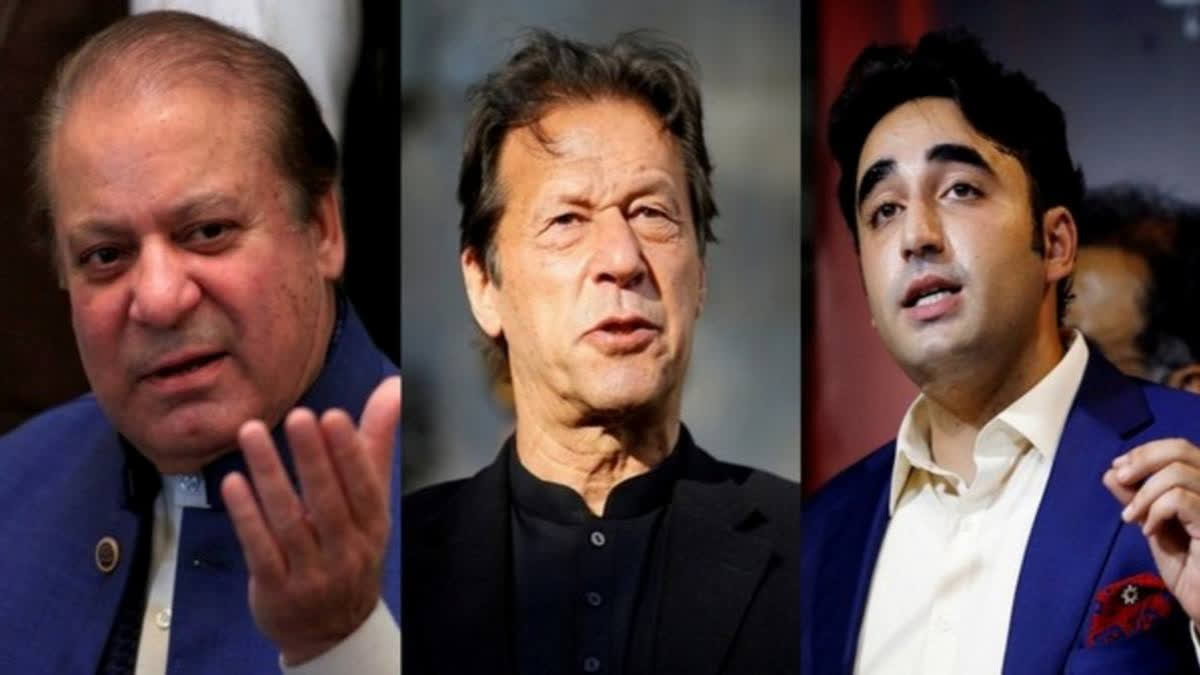Islamabad (Pakistan):As Pakistan prepares for the General Elections on Thursday, persistent polarisation and violence continue to pose dire challenges for the country. To closely monitor security arrangements nationwide, the Interior Ministry of Pakistan has set up a 'control room' to monitor the security during voting.
Nawaz Sharif, the supreme leader of the Pakistan Muslim League-Nawaz (PML-N), is seeking an unprecedented fourth term. He has made a powerful political comeback after four years of exile in London following his conviction on corruption charges. After returning to Pakistan in October, the majority of his sentences were reversed by the courts, allowing him to contest the elections.
Whereas, on the other hand, Imran Khan, founder of Pakistan Tehreek-e-Insaaf (PTI) and considered one of the most popular leaders in the country, is incarcerated in Adiala jail on multiple charges. The cricketer-turned-politician has been disqualified from contesting the polls and has been sentenced to 10 years in the cypher case, 14 years in the Toshakhana case, and seven years in the 'un-Islamic' marriage case.
Additionally, the Pakistan Supreme Court upheld the Election Commission of Pakistan's decision to revoke the party's iconic 'bat' symbol. However, Khan has maintained that all the cases against him are "politically motivated" and has vowed that his party PTI will spring a 'surprise' on February 8, Dawn reported. In a video message posted on his official handle, Khan urged his supporters to come out and vote in large numbers.
"Elections are tomorrow. I want you to come out and bring out as many people as you know. Because you will change the fate of yourself as well as that of your children through these elections," Khan said. Meanwhile, amid escalating political tensions and Pakistan's ongoing economic crisis, Nawaz Sharif aims to articulate his vision for addressing the multifaceted challenges confronting Pakistan.
Sharif has also vowed to establish "good relations" with India and said that he does not seek revenge. "We want an independent and comprehensive foreign policy. We want to deal world with grace and equality. We want to make Pakistan an economic power by establishing friendly relations with neighbouring states. Pakistan can't be developed by fighting or clashing with others. I believe in development not in revenge," he said while addressing a political rally last October.
In the election manifesto, PML-N has pledged to ensure youth representation in national politics through parliament and provincial and local governments and to combat the impacts of climate change and a "zero-tolerance policy" towards terrorism. PML-N urged its supporters to vote for Nawaz Sharif, claiming that Pakistan witnessed a "golden era" under PML-N tenure from 2013-18.
"The years from 2013 to 2018 marked a golden era for Pakistan. Let's continue the journey of progress and prosperity. Vote wisely! VOTE SHER," PML-N posted on Wednesday. Sharif's main challenger is Bilawal Bhutto Zardari (35), the Chairman of the Pakistan People's Party (PPP). Bilawal, the son of slain PM Benazir Bhutto, has positioned himself as a young alternative to the veteran Sharif.
